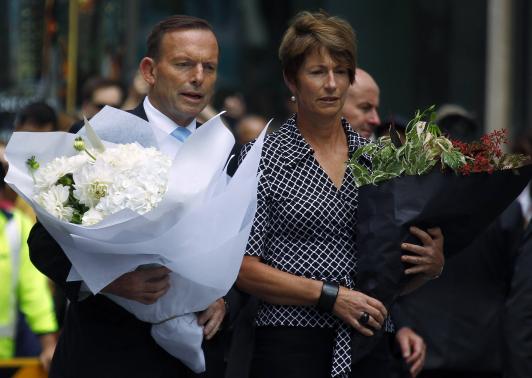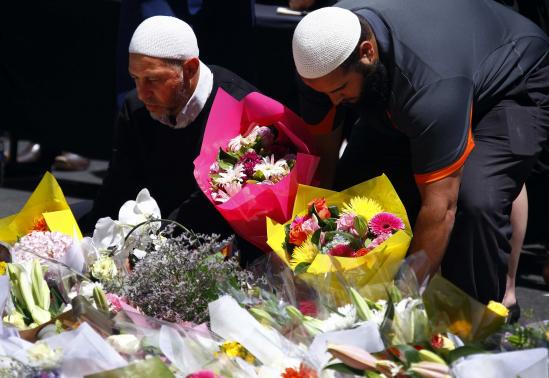www.aljazeerah.info
News, December 2014
Archives
Mission & Name
Conflict Terminology
Editorials
Gaza Holocaust
Gulf War
Isdood
Islam
News
News Photos
Opinion Editorials
US Foreign Policy (Dr. El-Najjar's Articles)
www.aljazeerah.info
|
Editorial Note: The following news reports are summaries from original sources. They may also include corrections of Arabic names and political terminology. Comments are in parentheses. |
Sydney Hostage Ordeal After Australian Involvement in Permanent Middle East Wars
December 16, 2014
Editor's Note:
Here's another example of how government officials and their mouthpieces in the media can't wait to exploit any criminal incident for their own purposes, in this case to justify the Australian involvement in the permanent wars for Israel and oil in the Middle East.
Just like in the story of the Canadian man who was killed in the Parliament building, there had been heavy attempts to focus on Islam, just because the person involved was known as a Muslim.
If the offender is not a Muslim, then government officials and their media mouthpieces won't mention his religion, exactly as what has happened today in the story of the man who killed his family members in Philadilphia.
 |
 |
| Australian Prime Minister and his wife | Australian Muslim leaders |
'Lone wolf' Australian hostage-taker had violent, unsettled past
By Matt Siegel
SYDNEY Tue Dec 16, 2014 8:22am EST
(Reuters) -
The self-styled sheikh behind a siege at a Sydney cafe had been charged as an accessory to murder and with multiple sexual offences. He also harbored deep grievances against the Australian government and had found little kinship in the city's large Muslim community, where he was seen as deeply troubled.
Man Haron Monis, an Iranian refugee described by those who knew him as a loner, was killed early on Tuesday after heavily armed police stormed the Lindt Chocolate Cafe to end a 16-hour hostage drama that made global headlines.
Last year Monis was charged as an accessory to the stabbing murder of his ex-wife, who was set alight in a Sydney apartment block. He was charged this year with more than 40 counts of sexual or indecent assault against women in Sydney, according to court documents.
He was also found guilty in 2012 of sending threatening letters to the families of eight Australian soldiers killed in Afghanistan and sentenced to two years in prison, although he served only a portion of that penalty.
Those charges and the conviction, as well as public statements Monis made on his website, have raised questions in Australian media about whether authorities should have done more to monitor him.
Prime Minister Tony Abbott told reporters that Monis was well known to police. When asked by a journalist whether it was appropriate for Monis to have been granted bail for the murder charge, New South Wales state Premier Mike Baird declined to comment.
Monis's website, now taken down by authorities, painted a picture of a man unraveling, enraged by Australian courts and by perceived injustices against Muslims in Iraq and Afghanistan.
"Man Haron Monis ... has continuously been under attack & false accusation by the Australian government & media since he started his political letter campaign from 2007," Monis wrote on the website.
He also railed against what he said was a decision by a court to prevent him from seeing his children.
"His children have been taken away from him by the Australian government and he is not allowed to visit or even call them," Monis wrote.
UNSETTLED LONER
Sydney-based criminal defense lawyer Adam Houda, who represented Monis over the letters sent to the soldiers' families, described him as a deeply unsettled loner, wholly apart from Sydney's tight-knit Muslim community.
"He was a very, very, very unusual guy, and he had no affiliations with any group. He operated alone. He was a lone wolf," Houda told Reuters.
A source close to Sydney-based Islamists, speaking on condition of anonymity, said Monis did not belong to any local radical group and that leading figures held him in contempt.
In December Monis seemed to suggest on his website that he had switched from Shi'ite to Sunni Islam, which would help explain media reports that he had demanded police bring a flag from militant Sunni Islamist group Islamic State to the cafe.
"I used to be a Rafidi, but not anymore," he wrote, using an Arabic word that can be translated as "heretic" and is sometimes used by Sunnis as an abusive term for Shi'ites.
"Now I am a Muslim," he added.
Monis left predominantly Shi'ite Iran in the late 1990s after coming into conflict with authorities there, said lawyer Manny Conditsis, who represented him in the murder case.
After receiving asylum in Australia in 2001, Monis obsessed about exposing violence against Muslim civilians abroad, Conditsis told Reuters.
His website showed graphic images of children that he says were killed by U.S.-led coalition air strikes, as well as media coverage following his court appearances and statements addressed to the Muslim community and Abbott.
DEEP SCARS
He compared himself to Wikileaks founder Julian Assange, saying he was being persecuted for his political beliefs.
"Since the Australian government cannot tolerate Sheikh Haron's activity, (it) is trying to damage his image by these false accusations," he wrote.
While in prison Monis claims he was tortured, smeared with excrement and forced to sleep on a bare concrete floor, Conditsis said.
"I know that left quite deep scars for him," he said.
"If he had formed the view prior to this siege that he was going to inevitably go back to prison, whether he was guilty or not ... I can see that might have unhinged him."
Despite the warning signs, police must focus limited resources on groups attempting to pull off major terrorist attacks, said Greg Barton, director of the Global Terrorism Research Center at Monash University in Melbourne.
Barton said there was only a tiny category of people at any given time police can legally and financially justify keeping under surveillance.
"On the triage priority list, he would be well down that list," he said.
"I don't think it's a case of a failure or a mistake. I just think it's a case of the harsh reality of dealing with this kind of threat."
Abbott seemed to confirm as much on Tuesday evening, when he told reporters that Monis had not been on any watchlist.
"Even if this individual had been monitored 24 hours a day, it's quite likely, certainly possible, that this incident could have taken place," Abbott said.
(Additional reporting by Lincoln Feast and Swati Pandey in SYDNEY; Editing by Mike Collett-White, Paul Tait, Dean Yates and Will Waterman)
Hostage taking in Sydney cafe sparks fears of Islamist-linked attack
Mon Dec 15, 2014 6:25am EST
By Matt Siegel and Jane Wardell
SYDNEY, Dec 15 (Reuters) -
Australian police locked down the centre of the country's biggest city on Monday after an armed man walked into a busy downtown Sydney cafe, took hostages and forced them to display an Islamic flag, igniting fears of a jihadist attack.
Police said they knew of one armed assailant involved in the incident at the Lindt chocolate cafe in the heart of Sydney's financial district, but there could be more.
Police, including paramilitary officers, cordoned off several blocks around the cafe as negotiators tried to defuse one of the biggest security scares in Australia for decades. Snipers and a SWAT team took up positions around the cafe and police helicopters flew overhead.
At least five hostages have been released or escaped since the mid-morning siege began, with terrified cafe workers and customers seen running into the arms of paramilitary police.
About 15 hostages could still be seen inside the cafe, said Chris Reason, a reporter at Channel Seven, whose office is opposite the cafe.
"From inside Martin Place newsroom we can see gunman is rotating hostages, forcing them to stand against windows, sometimes 2 hours at a time," Reason said on Twitter.
Prime Minister Tony Abbott, who has warned of militant plans to strike Australian targets, said there were indications the hostage-taking was politically motivated.
"This is a very disturbing incident. I can understand the concerns and anxieties of the Australian people," Abbott told reporters in Canberra.
Australia, a staunch ally of the United States and its escalating action against the Islamic State in Syria and Iraq, is on high alert for attacks by home-grown militants returning from fighting in the Middle East.
"We have moved to a footing that would be consistent with a terrorist event," Andrew Scipione, police commissioner for the state of New South Wales, told reporters, declining to comment on a possible motive, the number of assailants or hostages.
News footage showed hostages holding up a black and white flag displaying the Shahada - a testament to the faith of Muslims. The flag has been popular among Sunni Islamist militant groups such as Islamic State and al Qaeda.
(Writing and by Lincoln Feast; Additional reporting Swati Pandey, Colin Packham, Wayne Cole and Jason Reed; Malini Menon in New Delhi; Editing by Paul Tait, Raju Gopalakrishnan, Robert Birsel)
***
Share this article with your facebook friendsFair Use Notice
This site contains copyrighted material the
use of which has not always been specifically authorized by the copyright
owner. We are making such material available in our efforts to advance
understanding of environmental, political, human rights, economic,
democracy, scientific, and social justice issues, etc. We believe this
constitutes a 'fair use' of any such copyrighted material as provided for
in section 107 of the US Copyright Law. In accordance with Title 17 U.S.C.
Section 107, the material on this site is
distributed without profit to those
who have expressed a prior interest in receiving the included information
for research and educational purposes. For more information go to: http://www.law.cornell.edu/uscode/17/107.shtml.
If you wish to use copyrighted material from this site for purposes of
your own that go beyond 'fair use', you must obtain permission from the
copyright owner.
|
|
|
|
||
|
||||||


